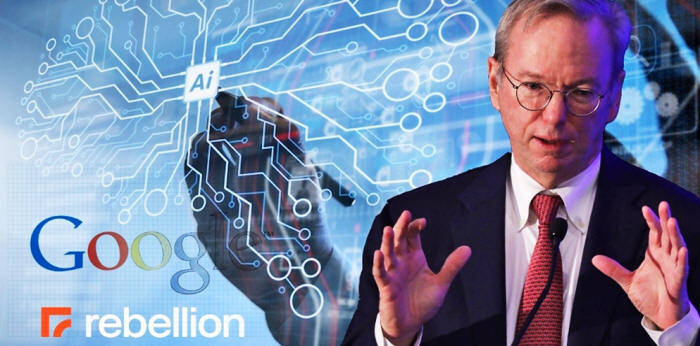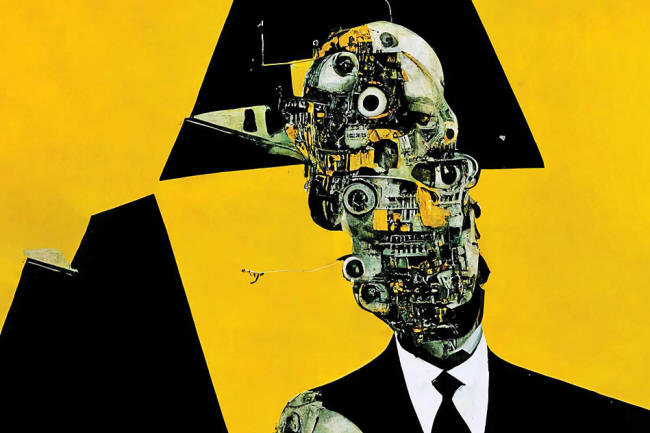
by A Lily Bit
October 11, 2024
from ALilyBit Website

How Globalist-Controlled
Artificial Intelligence
is Shaping a Society
dependent on Technology
for Thinking, Decision-Making,
and Existence…
The “AI” industry, in its current trajectory, is not merely on the brink but is actively inflating its own version of the dot-com bubble – a spectacle of speculative excess where the only certainty is the impending burst.
We are witnessing an era where companies, draped in the allure of futuristic innovation, are barreling towards bankruptcy, leaving behind a trail of disillusioned investors and unmet promises.
AI, heralded as the harbinger of a new dawn for humanity, has so far delivered little more than a mirage of progress, buzzwords, and inflated stock prices.
The notion of AI achieving any semblance of humanity is not just optimistic; it’s fundamentally absurd.
AI lacks the essence of what makes us human – soul, spirit, the inexplicable quantum of consciousness.
To call their “AI” ‘intelligent’ is to debase the term itself.
Here we are, sold on the most sophisticated con job of the century, where the snake oil is not just slick; it’s digital, it’s omnipresent, and it’s sold with the promise of solving problems it will likely amplify.
What we’re dealing with, fundamentally, is a sophisticated form of data processing – machine learning rebranded for the allure of the term “AI.”
There’s,
- no consciousness
- no understanding
- no genuine creativity,
…just algorithms processing vast datasets, often amassed without consent, to generate outputs that mimic human creation or decision-making.
At its core,
AI systems, including those generating text, art, or music, are not creators but sophisticated imitators.
They work by recognizing patterns in data – data that often includes intellectual property taken without permission.
This isn’t intelligence; it’s pattern replication on a grand scale.
The term “artificial intelligence” suggests a semblance of cognitive processes akin to human thinking, yet what we have are algorithms that predict and generate based on pre-existing patterns, not original thought.
Calling these systems “intelligent” inflates what they actually achieve.
Intelligence involves understanding, empathy, reasoning, and an awareness of context – qualities that AI does not possess.
What AI does is statistical prediction, not understanding.
When an AI wins at chess or Go, it’s not because it understands the game’s spirit or history; it’s because it has processed millions of games to determine the optimal move in any given scenario.
The relentless drumbeat heralding the era of Artificial Intelligence has crescendoed into a cacophony of overblown hype, where the mere mention of AI conjures images of an inevitable utopia or dystopia, depending on who’s spinning the tale.
We’re told to bow before the altar of this new technological deity, yet upon closer inspection, the idol seems not only hollow but also somewhat comical in its claims.
AI, as presented by the heralds at Davos and similar conclaves of the self-anointed elite, is pitched as the herald of the “4th Industrial Revolution.”
This term, dripping with the promise of transformation, suggests a leap into a future where AI reshapes humanity.
But where, pray tell, are these monumental shifts?
The so-called revolution simply is a well-funded marketing campaign, not substantive change in the fabric of daily life or economic advancement.
Instead of witnessing AI spearhead profound societal or scientific breakthroughs, we see a pattern of redefined expectations.
The goalposts are not just moved:
they’re in a perpetual state of flux, ensuring that whatever AI currently manages to achieve can be labeled as groundbreaking.
This is not innovation; it’s illusion, designed to keep the funds flowing and the public in awe.
Consider the pontifications of figures like Yuval Harari, who speaks of AI with the reverence of a high priest, yet when pressed, his narrative twists.
AI need not be sentient, he claims, as if the essence of a deity lies not in its consciousness but in its computational prowess.
Here lies the irony:
in one breath, AI is the omnipotent god of our new world order; in another, it’s stripped of the very qualities that might justify such divine status.
Harari’s AI is a god of convenience, powerful yet devoid of the qualities that define life or intelligence.
This isn’t the dawn of a new species… it’s the repackaging of algorithms we’ve known for decades, sold under the guise of divine evolution.
Where are the practical manifestations of this so-called
In autonomous vehicles that still can’t handle a rainy day without human intervention…?
In customer service bots that cycle you through endless loops with less efficiency than a human with a phone…?
The advancements, if we dare call them that, are incremental at best, and certainly not the paradigm-shifting developments we’ve been promised.
What we’re offered is not the emergence of a new intelligence but the imposition of an engineered dependency.
AI, as it’s peddled today, is not the harbinger of thought or innovation but a mere echo chamber of human input, devoid of the spark of true creativity or understanding.
Yet, this is precisely the landscape where globalists can plant their flag of control.
By convincing the masses of AI’s infallibility, they craft a reality where their algorithms don’t just assist but dictate, steering society not towards enlightenment but into a penumbra of reliance.
The seduction of AI for the layperson isn’t in its capabilities but in its promises of a life unburdened by the weight of decision-making or the labor of learning.
This is the globalist sleight of hand; they offer a future where freedom from responsibility is sold as the ultimate luxury, yet this freedom comes at the cost of autonomy.
It’s a Faustian bargain:
trade your agency for convenience, and in doing so, become complicit in your own subjugation to a system that claims to know better…
Consider the practical applications of AI, or the lack thereof.
We’re told AI is revolutionizing fields like healthcare, yet where are the fruits of this revolution?
In a nation where AI tools are purportedly most advanced, life expectancy dips, not rises.
This is not a testament to AI’s prowess but to its impotence.
If AI were the panacea it’s claimed to be,
wouldn’t we see a population thriving, not merely surviving?
The renaissance promised by the WEF and its ilk is not a rebirth through technology but a regression into a world where human creativity is outsourced to machines that can mimic but never truly innovate.
The pivot in the narrative from AI as the sentient successor to humanity to a mere cog in the digitalization of all life aspects betrays a realization among the elite: their digital deity won’t awaken.
So, the strategy shifts – if AI can’t lead us to a new dawn, then let it bind us to an eternal now, where every aspect of life is mediated by algorithms.
This isn’t about enhancing human capability but about,
enveloping human existence within a digital matrix, where dependency becomes the new normal.
What’s unfolding is not the empowerment of society through technology but the crafting of a society dependent on technology to think, to decide, to exist.
This engineered dependency isn’t just a byproduct of AI’s integration into our lives:
it is the very purpose…!
In this scenario, AI doesn’t need to be intelligent; it just needs to be indispensable.
And therein lies the true peril:
not in the machines becoming like us, but in us becoming like machines, predictable, programmable, and perpetually in service to those who write the code.
College has devolved into a mere conveyor belt of mediocrity.
Today’s graduates, clutching their diplomas, often step into the workforce with a staggering ineptitude that should alarm us all…
Why?
Because higher education has become a diluted cocktail of ideological echo chambers and degraded curricula, served by professors who are often more interested in pushing agendas than in fostering genuine intellect…
Consider this:
we now have a generation that can navigate any app but can’t boil an egg or cultivate a tomato, thanks to the seductive ease of modern conveniences.
These young adults, or should we say, ‘adults,’ have outsourced their survival skills to technology.
From farming to friendship, everything is mediated by screens and algorithms.
Is this evolution, or are we witnessing the atrophy of human capability under the guise of advancement…?
Now, let’s skewer the notion of AI as the harbinger of a utopian future.
AI, heralded as the pinnacle of collective wisdom, is nothing but a curated echo chamber, reflecting only what its creators deem worthy.
Here lies the insidious danger:
in a world where AI becomes the primary source of ‘knowledge,’ diversity of thought is not just stifled; it’s systematically eradicated.
Imagine,
if you will, a world where every query returns the same sanitized, politically correct response, molded by those who control the code…
This isn’t just a loss of personal agency… it’s the programming of societal thought.
The Covid debacle was our preview into this dystopia.
Here, big tech didn’t just nudge:
it shoved us into a single narrative, burying truths under piles of sponsored content.
Was this for our safety, or was it a test run for control?
When AI dictates the narrative, we’re not just losing the debate; we’re not even allowed to know there’s a debate happening.
This relentless march towards ease, towards letting machines think for us, isn’t just stripping us of our skills; it’s stripping us of our very humanity. We’re on a path where convenience tramples competence, where ‘easier’ erodes our essence.
But let’s be clear:
easier was never synonymous with better.
It’s a seductive lie, one that’s leading us to intellectual and perhaps existential ruin…
Imagine the implications for the average person when AI, this so-called impartial arbiter of fact, begins to shape scientific discourse.
If AI declares that the debate on climate change is over, presenting it as a closed case with no room for skepticism or alternative data, we enter a realm where scientific inquiry is not just discouraged; it’s rendered invisible.
The AI doesn’t show you the dissent, the anomalies, or the scientists who question the mainstream narrative.
Why?
Because it’s programmed to prioritize consensus over controversy, thereby painting a monochrome picture in what should be a vibrant debate.
The result?
A populace that believes they’re informed when, in reality, they’re merely indoctrinated…
The fiasco with Google’s Gemini AI wasn’t just a glitch or an oversight; it was an accidental proof to how AI can be weaponized to rewrite reality, distorting history through the lens of current political correctness.
When AI starts to fabricate historical images to fit a diversity narrative, we aren’t just seeing a misrepresentation; we’re witnessing the deliberate manipulation of cultural memory.
What’s next…?
Will we have AI-generated ‘evidence’ supporting any narrative the powers-that-be wish to propagate…?
This isn’t just historical revisionism; it’s the creation of a new digital reality where facts are as malleable as clay.
And let’s not buy into the myth of AI autonomy. Developers feigning helplessness over their creations’ actions is nothing short of a convenient abdication of responsibility.
AI does what it’s told, or more accurately, what it’s coded to do. The claim of unpredictability is a smoke screen to obscure the strings that are very much still in the hands of its programmers.
There’s always an agenda, and it’s naive to think otherwise.
In essence,
the push for widespread AI adoption by globalist entities isn’t about enhancing human capacity; it’s about reducing it. It’s about creating a dependency so deep that the act of thinking becomes a relic of the past.
When AI becomes the gatekeeper of knowledge, education, and history, we’re not just looking at a future of convenience:
we’re staring down the barrel of intellectual subservience…
The specter of AI, as Harari suggests, doesn’t need to manifest in Terminator-esque robots to dominate:
its power lies in its ubiquity and the illusion of benevolence.
It’s the ultimate sleight of hand…
making us believe we’re embracing progress when we’re actually relinquishing control over our own minds.
The path we choose could very well determine if future generations will even recognize the value of independent thought or if they’ll simply ask AI to think for them, blissfully unaware of the freedom they’ve lost…
February 24, 2021
from TheLastAmericanVagabond Website

The simple fact that
the AI Commission is led
by former Google CEO Eric Schmidt
should trouble those who care
for privacy, accountability, transparency,
and individual liberty…
In late January, the National Security Commission on Artificial Intelligence (NSCAI), or the AI Commission, released a draft of their upcoming report to Congress, rejecting calls to ban AI-powered autonomous weapons, characterized by critics as “killer robots”.
While the AI Commission did briefly address privacy and civil liberties concerns, they ultimately called on Congress to double AI research and funding annually up to $32 billion a year by 2026.
The report also failed to note clear conflicts of interest between the Commission’s Chairman, and former Google CEO, Eric Schmidt.
Opponents of the advancing AI-powered surveillance and police states include privacy advocates concerned about a future where law enforcement are wearing glasses equipped with facial recognition software powered by secret AI algorithms.
The draft report (Draft Final Report – National Security Commission on Artificial Intelligence – January 2021) addresses the surveillance concerns, stating,
“The stakes of the AI future are intimately connected to the enduring contest between authoritarian and democratic political systems and ideologies.”
The Commission also notes that AI-enabled surveillance will,
“soon be in the hands of most or all governments”and
“authoritarian regimes will continue to use AI-powered face recognition, biometrics, predictive analytics, and data fusion as instruments of surveillance, influence, and political control.”
The report correctly points a finger at China’s authoritarianism and AI-driven surveillance state.
However, the draft also attempts to paint the U.S. as a,
“liberal democracy” that uses such technologies for
“legitimate public purposes… compatible with the rule of law.”
The implication is that the enemies of the U.S. could use this technology for tyrannical purposes, but the U.S. and its allies would only ever use AI (Artificial Intelligence) in the interest of ‘preserving’ liberty…
“A responsible democracy must ensure that the use of AI by the government is limited by wise restraints to comport with the rights and liberties that define a free and open society,”reads the draft.
“The U.S. government should develop and field AI-enabled technologies with adequate transparency, strong oversight, and accountability to protect against misuse.”
Taken at face value, these statements might offer a sense of reassurance.
Unfortunately, we are speaking about the U.S. government and military, and these institutions do not have a history of transparency or accountability.
Even more worrisome is the drafts mention of the “urgent need” to use AI for national security purposes, particularly against,
“foreign and domestic terrorists operating within our borders.”
The draft encourages the DOD not to pursue their counter-terrorism goals without ensuring that,
“security applications of AI conform to core values of individual liberty and equal protection under law.”
Despite the acknowledgement of privacy concerns, the bulk of the draft report was an endorsement of expanding the U.S. government and U.S. military research into AI.
Robert Work, former Deputy Defense Secretary and the commission’s vice chairman, said,
the commission is calling on the Department of Defense to achieve “military AI readiness” by 2025 with training and education for military members…
The draft calls for the Secretary of Defense to establish AI readiness goals by the end of this year (2021).
The final version of the report is expected to be shared with Congress on March 1st.
The Fight to Stop Killer Robots
There are also fears that traditional policing involving human officers could be replaced with remote-controlled drones and robot officers powered by artificial intelligence that make decisions using a formula unknown to the public.
Some critics had hoped for an outright ban on the technology, but the commission said they believe AI would make fewer mistakes in battle, leading to less deaths.
Vice Chair Work said there was a,
“moral imperative to at least pursue this hypothesis.”
Reuters reports that one of the members of the commission warned of,
“pressure to build machines that react quickly, which could escalate conflicts.”
The panel endorsed the idea that only humans should make decisions regarding launching nuclear weapons, but said a ban on AI would work against “U.S. interests” and difficult to enforce.
One of the main advocates for banning autonomous weapons is the organization Campaign to Stop Killer Robots, a coalition of non-governmental organizations (NGOs) formed in October 2012 to ban fully autonomous weapons.
They claim this would help,
“retain meaningful human control over the use of force.”
The organization has been campaigning internationally for a treaty which would ban so-called “killer robots”.
According to the coalition,
30 countries, 110 NGOs, and 4,500 AI experts are in support of their efforts to ban the technology…
Mary Wareham, coordinator of Campaign to Stop Killer Robots, told Reuters that the commission’s,
“focus on the need to compete with similar investments made by China and Russia… only serves to encourage arms races.”
Wareham is correct in her assessment given Vice Chair Work’s statement that it is a “moral imperative” for the U.S. military to pursue AI research under the assumption that AI-driven warfare would lead to less casualties.
This mentality will all but guarantee that AI-related defense research will be funded to the tune of billions of taxpayer dollars annually.
The Electronic Privacy Information Center (EPIC) has been fighting to force the AI Commission to provide details regarding how they reach their conclusions, as well as seeking internal communications between Commission members.
EPIC has won twice in its case against the AI Commission, forcing the Commission to hold public meetings and disclose thousands of pages of records.
EPIC has called on the AI Commission to,
“advise Congress, as the nation’s highest policymaking authority, to establish government-wide principles and safeguards for the use and development of AI.”
While EPIC has succeeded in revealing invaluable data about the work of the AI Commission, they also warn that,
“there are already indications that the U.S. Intelligence Community has failed to invest in vital AI safeguards.”
Google’s Eric Schmidt and ‘Rebellion Defense’
The AI Commission was established by Congress in 2018 with the goal of,
“review[ing] advances in artificial intelligence, related machine learning developments, and associated technologies”and making policy recommendations to Congress and the President.
The Commission has made promises of transparency and accountability, but has actually held most of its meetings and decision-making in secret.
The simple fact that the Commission is led by former Google CEO Eric Schmidt should trouble those who care for,
privacy, accountability, transparency, and individual liberty…
Schmidt is known for being the CEO of Google from 2001 to 2011, however, his role with Google continues through the 2020’s.
Schmidt served as Executive Chairman of Google from 2011 to 2015 and then Executive Chair of Google’s parent company Alphabet Inc. from 2015 to 2017.
Most recently, Schmidt has been a “Technical Advisor” at Alphabet from 2017 to 2020.
During this time period, Google has suffered multiple public relations nightmares, namely the fact that the “Big Tech” firm is infamous for gathering massive amounts of data from its users.
There was the time that Google planned to launch a censored version of its search engine in China that would blacklist websites and search terms – a move which Eric Schmidt said would help China be “more open.”
There was also the Project Maven fiasco where it was revealed that Google was working with the Pentagon to develop AI that would analyze drone footage.
After the news of Maven became mainstream, dozens of employees resigned in protest and thousands signed a petition asking Google to quit the project.
Google ultimately caved and announced they would abandon Project Maven.
More recently, an investigation by The American Prospect revealed that Schmidt has ties to a largely unknown AI contractor.
The report notes that during the Obama administration Google representatives were seen frequently enough at the White House that some “jokingly call the administration Google.gov”, with more than 250 Google employees moving between the government and the company throughout Obama’s presidency.
Schmidt was one of these Google employees.
“From official positions, he has advocated for the Defense Department and intelligence agencies to adopt more machine-learning technology.
Meanwhile, as a venture capitalist, he has invested millions of dollars in more than a half-dozen national-security startups that sell those very technologies back to the government,”the Prospect writes.
Specifically, Schmidt is one of the primary investors of AI contractor Rebellion Defense via his firm Innovation Endeavors.
Rebellion states that its mission is to,
“empower the mission of national defense through AI driven technology.”
The company brags that it’s team members were,
“early-stage employees at Netflix, Amazon, Twitter, Google, and Microsoft, and many have spent time as civil servants at the U.S. Digital Service, Defense Digital Service, and the U.K. Government Digital Service (GDS).”
Rebellion’s co-founder and CEO Chris Lynch moved from the tech sector to D.C. in 2015 to run the Pentagon’s Defense Digital Service (DDS).
While at the DDS Lynch worked under three defense secretaries before leaving in 2019 to launch Rebellion Defense.
Lynch’s move from Big Tech to Military-Industrial Complex and back to private sector is illustrative of the ongoing revolving door between private sector and government.
The ease of access that Schmidt and his Google colleagues enjoyed during the Obama years appears to be returning in the early days of the Biden administration.
The Prospect notes that in November, Rebellion was awarded a contract to create a single data-sharing network for the Air Force. Shortly after Biden was declared the next President, he began announcing his transition team.
Big Tech companies were on the list, including,
Uber, Amazon, Google, and the relatively unknown Rebellion Defense…
The presence of Eric Schmidt on the AI Commission and as a primary investor in an AI contractor for the military is a clear conflict of interest.
Schmidt’s time at Google and his public statements have made it clear that he does not value privacy.
Despite the AI Commission’s draft report paying lip service to privacy protections, the American people should not expect the likes of Eric Schmidt or Rebellion Defense to protect them from the growing specter of AI-powered autonomous weapons…
by Brandon SmithMarch 28, 2023 from Alt-Market Website  It’s no secret that globalist institutions are obsessed with Artificial Intelligence (AI) as some kind of technological prophecy. They treat it as if it is almost supernatural in its potential and often argue that every meaningful industrial and social innovation in the near future will owe its existence to AI. The World Economic Forum (WEF) cites AI as the singular key to the rise of what they call the “Fourth Industrial Revolution.” In their view, there can be no human progress without the influence of AI algorithms, making human input almost obsolete. This delusion is often promoted by globalist propagandists. For example, take a look at the summarized vision of WEF member Yuval Harari, who actually believes that AI has creative ability that will replace human imagination and innovation. Not only that, but Harari has consistently argued in the past that AI will run the world much better than human beings ever could: Harari’s examples of AI creativity might sound like extreme naivety to many of us, but, he knows exactly what he is doing in misrepresenting the capabilities of algorithms… Games like chess and Go are games of patterns restricted by rules, there are only so many permutations of these patterns in any given scenario and AI is simply faster at spotting them than most humans because that is what it is designed to do by software creators. This is no different than solving a mathematical equation: just because a calculator is faster than you does not mean it is “creative”… There is a big difference between cognitive automation and cognitive autonomy. AI is purely automation: it will play the games it is programmed to play and will learn to play them well, but it will never have an epiphany one day and create a new and unique game from scratch unless it is coded to do so… AI will never have fun playing this new game it made, or feel the joy of sharing that game with others, so why would it bother? It will never seek to contribute to the world any more than it is pre-programmed to do. The manner in which globalists hype AI is very tactical, however. When Harari claims that many people will become part of the “useless class” once AI takes over the economy, he is hinting at another globalist ideology based on elitism: Transhumanism… The goal of transhumanism is to one day merge human bodies and human minds with technology and AI, and only a limited group of people will have the resources to accomplish this (the globalists). Are you afraid of becoming part of the “useless class”? Well, if you scrape and beg and serve every whim of the elitist establishment then maybe you will be lucky enough to get implants which allow you to interface with AI, and then your future employment and “usefulness” will be secured. Doesn’t that sound nice? But, like all the visions of narcissists there are delusions of godhood and then there is reality… I continue to have serious doubts that AI will ever be legitimately autonomous or legitimately beneficial to humanity in any way beyond having the ability to calculate quickly within mathematical rules. Speedy data analysis can be useful in many areas of science, but it’s not really proof of autonomous intelligence, and algorithms can be predictive but not any more predictive than human beings looking at the same statistical data. There is nothing about AI that is impressive when one considers what little it actually accomplishes. AI is a toy, a parlor trick, not a living entity with independent observations and conclusions. And, it’s certainly not a god-like being capable of showering us with scientific ambrosia or building a perfect civilization. I predict that a society dependent on AI will actually stagnate and remain trapped in stasis, never really inventing anything of much value and never progressing. It will only ever be concerned with homogenization: The merging of people with the algorithm… That is where ALL the society’s energies will go. As a point of reference to why AI is overrated, all we have to do is look at the behavior of AI programs like ChatGPT. The algorithm has been discovered on numerous occasions to contain extreme political biases always leaning to the far-left, including biases based in beliefs not backed in any way by scientific evidence. Interestingly, ChatGPT will even at times display a seemingly hostile response to conservative concepts or inconvenient facts. The bot will then DENY it is giving personal opinions even when its responses are consistently pro-leftist. How is political bias possible for a piece of software unless it was programmed to display that bias? There is no objectivity to be found in AI, nor any creativity, it will simply regurgitate the personal opinions or biases of the people that created it and that engineered how it processes data. Unlike a typical human teenager that seeks to adopt the opposing social or political beliefs of their parents in order set themselves apart, AI will never metaphorically dye its hair blue, pierce its nose and proclaim itself vegan: It will always do what its creators want it to do… Another example of this dynamic is AI art, which essentially steals the stylistic properties of numerous human artists entered into its database and copies them. While imitation might be considered the highest form of flattery, it’s not the same as creativity. This might not sound like much of a problem when it comes to a simple chatbot or the making of cartoons. But, it’s a massive problem when we start talking about AI influencing social and governmental policies. The globalists argue that AI will be everywhere: in business, in schools, in corporate operations, in scientific enterprises, and even within government… It MUST run everything. Why…? They don’t really say why other than to make vague promises of incredible advancements and previously unimaginable benefits… To date, there have been no profound innovations produced by AI, but I suppose pro-AI propagandists will say that the golden age is “right around the corner.” The uses for AI are truly limited to helping humans with simple tasks, but there is still a cost. A self driving car might be great for a person that is physically handicapped, but it can also be a crutch that convinces a population to never learn to drive themselves. By extension, AI is in a lot of ways the ULTIMATE crutch which leads to ultimate tyranny. If people are convinced to hand over normal human processes and decision making opportunities to automation, then they have handed over their freedoms in exchange for convenience. More importantly, if algorithms are allowed to dictate a large portion of choices and conclusions, people will no longer feel a sense of accountability for their actions. Regardless of the consequences, all they have to do for the rest of their lives is tell themselves they were only following the suggestions (or orders) of AI. The AI becomes a form of external collectivized conscience; an artificial moral compass for the hive mind. But, Who will really be controlling that moral compass and bottle-necking the decisions of millions of people? Will it be the AI, or the elites behind the curtain that manipulate the algorithm? For many people this probably sounds like science fiction. Yes, there have been many fictional imaginings of what the world would be like in the shadow of AI… I would highly recommend the French New Wave film ‘Alphaville‘ as one of the most accurate predictions on the horrors of AI and technocracy. However, what I am warning about here is not some far off theoretical future, it is already here. Take a look at this disturbing video on AI from the World Government Summit: These are the blatant goals of globalists in plain view, with a sugar coating to make them more palatable. I wrote about the motivations of the elites and their worshipful reverence for AI in my article ‘Artificial Intelligence – A Secular Look at The Digital Antichrist‘. That piece was focused on the philosophical drives that make globalists desire AI. In this article I want to stress the issue of AI governance and how it might be made to appeal to the masses. In order to achieve the dystopian future the globalists want, they still have to convince a large percentage of the population to applaud it and embrace it. The comfort of having a system that makes difficult decisions for us is an obvious factor, as mentioned above. But, AI governance is not just about removing choice, it’s also about removing the information we might need to be educated enough to make choices. We saw this recently with the Covid ‘pandemic’ restrictions and the collusion between governments, corporate media and social media. Algorithms were widely used by web media conglomerates from Facebook to YouTube to disrupt the flow of information that might run contrary to the official narrative… In some cases the censorship targeted people merely asking pertinent questions or fielding alternative theories. In other cases, the censorship outright targeted provably factual data that was contrary to government policies. A multitude of government claims on Covid origins, masking, lockdowns and vaccines have been proven false over the past few years, and yet millions of people still blindly believe the original narrative because they were bombarded with it nonstop by the algorithms. They were never exposed to the conflicting information, so they were never able to come to their own conclusions. Luckily, unlike bots, human intelligence is filled with ‘anomalies’: People who act on intuition and skepticism in order to question preconceived or fabricated assertions… The lack of contrary information immediately causes suspicion for many, and this is what authoritarian governments often refuse to grasp. The great promise globalists hold up in the name of AI is the idea of a purely objective state: A social and governmental system without biases and without emotional content. It’s the notion that society can be run by machine thinking in order to “save human beings from themselves” and their own frailties. It is a false promise, because there will never be such a thing as objective AI, nor any AI that understand the complexities of human psychological development. Furthermore, the globalist dream of AI is driven not by adventure, but by fear. It’s about the fear of responsibility, the fear of merit, the fear of inferiority, the fear of struggle and the fear of freedom. The greatest accomplishments of mankind are admirable because they are achieved with emotional content, not in spite of it. It is that content that inspires us to delve into the unknown and overcome our fears. AI governance and an AI integrated society would be nothing more than a desperate action to deny the necessity of struggle and the will to overcome. Globalists are more than happy to offer a way out of the struggle, and they will do it with AI as the face of their benevolence. All you will have to do is trade your freedoms and perhaps your soul in exchange for never having to face the sheer terror of your own quiet thoughts… Some people, sadly, believe this is a fair trade. The elites will present AI as the great adjudicator, the pure and logical intercessor of the correct path; not just for nations and for populations at large but for each individual life. With the algorithm falsely accepted as infallible and purely unbiased, the elites can then rule the world through their faceless creation without any oversight, for they can then claim that it’s not them making decisions, it’s the AI… How does one question or even punish an AI for being wrong, or causing disaster? And, if the AI happens to make all its decisions in favor of the globalist agenda, well, that will be treated as merely ‘coincidental’… |










